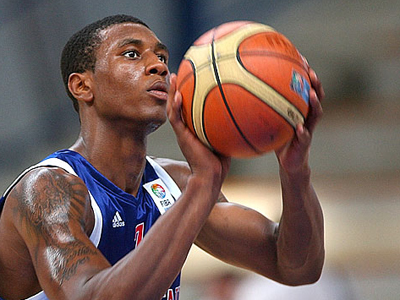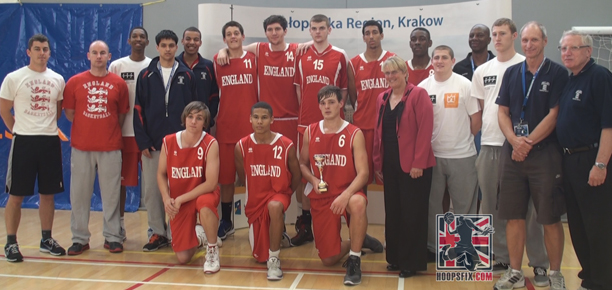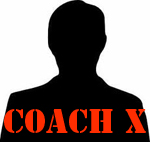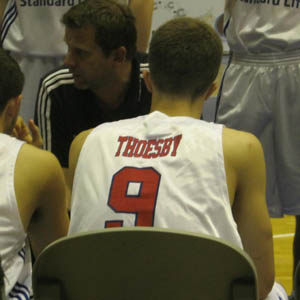Coach X: Bring Back National Pride

DISCLAIMER: The views and opinions expressed in the below article are solely of the author’s and do not necessarily represent those of Hoopsfix.
Introducing “Coach X”, our newest regular contributor on Hoopsfix.
Coach X has been heavily involved with British and European basketball for almost two decades, possessing an unparalleled wealth of knowledge. His involvement has ranged from playing, all the way through to coaching at both grassroots and professional levels.
Genuinely caring about seeing British kids not only succeed as players but people, he has taken this opportunity to work with Hoopsfix to voice opinions that would otherwise go unheard. It goes without saying, due to a variety of reasons, he has chosen to remain anonymous. You can contact him on coachx[@]hoopsfix.com
In his first blog here on Hoopsfix, he’s chosen to talk about the “honour” that comes with playing for a National team in the UK.
When British Basketball announced the initial squad list for this season’s Great Britain Under-20 program the press release took the very unusual step of naming the players that had withdrawn their name for consideration. It announced that nine players were ‘considered’ for the program but had decided not to commit to playing; Teddy Okereafor, Tom Pereira, Ovie Soko, Raheem May-Thompson, Ryan Martin, Grant Fiorentinos, Aaron Geramipoor, Abodunrin Olaseni, and Vince Van Nes. All were reported to have college commitments and made themselves unavailable.

Ovie Soko is one of the players the GB U20s are missing this summer
Whilst some of these players have legitimate reasons to have to pulled out of the campaign to be part of the first male age group team to get promoted to the European A division, the fact that British Basketball felt they had to announce players not involved, and the size of the group makes you wonder what is behind such a large number of withdrawals from our national team programs.
It’s very difficult for people who haven’t been involved in national team programs before to comprehend why a young person might turn down the opportunity of representing their country. The issue, in my opinion, is that it’s not considered an honour to represent England or Great Britain in age group teams.
Many players’ first experience of national teams is when they are selected to join the England age group teams and invited to attend a training camp. I often hear the argument of how limited our time and access to our players is in comparison to other countries. Whilst there is some truth to this statement, what is actually more relevant is the poor systematic way in which these camps are put together. Players are often far too overloaded in such a short period of time, providing no real benefit to the program and as a consequence the players end up missing sessions when they return to their clubs in order to recuperate.
Training camps are already a hot topic on Hoopsfix because of the issues that the U18 boys team are currently going through. In all the arguments about players being out of shape and the controversial fitness program they are partaking in, not once have we considered that the players have had to miss out on a U18 European Championship. How must they be feeling to be deprived of this once in a life time experience? Most players of international level (at under 18) have aspirations of becoming professional players, that means that their body and their health could be the ‘ticket’ that earns them their living for the rest of their lives. It’s not just the male teams either, two weeks ago the England U18 girls program, deep in preparation for their European Championships, stayed on a campsite with the players sleeping in tents and having to cook their own food. The idea was a “boot camp”; a team building exercise to bring them all together. Perhaps a nice idea in theory, but it was combined with a full practice and game schedule where players were expected to be physically and mentally ready to perform at the peak of their abilities. This shows a complete lack of care by the staff and governing body for the welfare and future careers of our ‘best’ young players.

Should players have to pay for the privilege of representing their country?
My biggest annoyance with England training camps however, is that players must pay for the privilege of attending camp. On average a weekend national team camp will cost £80 per player, not including the cost of getting to and from the venue. If we conservatively estimate that a player who attends every camp over the course of the season attends 5 camps plus an international tournament abroad (roughly £100) and add in travel expenses, we are probably looking at a bill of at least £600 a season. If we then also consider that players often stay in budget hotels, three to a room, sharing beds or sleeping on pull outs and eat McDonalds breakfasts then it starts to take the shine off being a junior international basketball player in this country.
Players who have the honour of being selected for England should be coming back from national team camps full of praise about experiencing the best facilities and resources available. Making their peers envious and impressed with stories of elite level basketball, and the invaluable information they’ve learnt from the expert coaches. Instead what we get is stories of poor facilities, out-dated strength and conditioning programs, and food and nutrition that fails to provide for the physical activity they are expected to do.
The experience that many players have throughout their U16 and U18 campaigns goes a long way to shape their expectations of national team programs and I have no doubt is a cause of some of the withdrawals for the U20 program.
At the U20 level, however, UK sport funding means that the issues around withdrawals are completely different and mainly stem from a complete lack of respect for the player. The majority of our players at this age are either at college in the states or are due to be starting in the near future. College coaches, as a rule, do not generally want their players to play for national team programs. They would much prefer their players to be on campus attending summer school where they can keep a watchful eye on the preparations for the next season. In return for our players going against the wishes of their college coach, what does our governing body do? How do they show their appreciation for loyalty to the program? How about, in one instance, spelling a player’s name incorrectly on the back of their jersey or perhaps not even bothering to research what college a player is at for the press release announcing their inclusion on a national team? If I was one those players I would also be wondering if they have even bothered to check how well my season has gone!
How respected do those players currently coming to the end of their college careers feel when they look at the recent Great Britain ‘Futures’ team and see an American (with a British passport) who played at an NCAA Division Three university, that didn’t even win half their games, present at the expense of numerous British bred players. Being developed in Britain appears to be a major negative for you if you want to be a player, coach or member of staff for Great Britain (but that’s a whole new article on its own)!
British Performance Basketball has a phrase that it loves to use about being ‘player driven’. I don’t think that we could be further from this ideal if we tried. From the age of 15 our players’ experience of national teams are so poor you can’t really blame them for not committing to play.
I believe that we should be a Division A team at every age group and I also believe that we have the coaches and players to make this a reality. It’s time that the Governing body and those people responsible for running our National teams restored the honour in playing basketball for your country.
___
Hoopsfix contacted both England Basketball and British Basketball to give them a chance to respond to this post. England Basketball commented;
“1. This revolves around how England Basketball is funded and how it allocates resources while remaining financially sound. Suffice to say that resources are limited and balancing the books is a skilful and expert task.
2. The available resources have to be spread carefully across a number of essential functions including performance: competitions & events, club development, officiating development, coach development, membership, schools, courses, equity & child protection and administration in a number of areas.
3. A significant and increasing amount is invested in performance not least so that the national teams have much more comprehensive programmes than previously.
4. In 2011 England Basketball is contributing to the costs of the national age-group teams (U16 and U18 boys and girls) up to the level of £30,000 each.
5. The player contributions are only a small proportion of the costs of any national team activity and in return they do get good value: invaluable training, playing and travel (and life) experiences including meals and accommodation and with high level team staff.
6. We work closely with the SportsAid charity that has supported thousands of young elite athletes over a number of decades. SportsAid is recognized and supported by Sport England as the prime charity for young sporting talent and aims to partner athletes with suitable funding organizations. National Team squad players are nominated for SportsAid grant awards to help towards the cost of their development as elite players and their key development activity is the national team programme. In the past 3 years our players have received around 200 awards totaling in excess of £100,000.
1. Of course we must do whatever we can to ensure that players are not excluded on financial grounds and the team staff have this awareness and they support the work with SportsAid. The Team Managers also assist players with applications to other sources such as their schools/colleges and local authorities. I know that Steve Alexander in London gives guidance to parents and players on funding opportunities through schools etc.
2. Feedback from other nations at the European Championships reveals that player contributions is the norm and that amounts are similar to us although some are significantly higher.
3. Other sports operate similarly – I raised the same question that you have a few years ago when my son was involved in tennis performance squads and I was surprised at the level of contributions required – and tennis is a relatively rich sport (£24m plus from Wimbledon every year on top of other revenues.
4. The respective team coaches, managers and physiotherapists volunteer their services.”
England Basketball also felt the figures given for playing for England were over-estimated. They are however, in fact lower than the figures given to Hoopsfix by players, parents and coaches.
Hoopsfix contacted a number of different federations in Europe, and have received replies from three (Portugal, Belgium and Slovenia). None of them expected contributions from any of their junior national team players at any point in the selection process. This will be updated as we receive further responses.
According to the SportsAid website, “Our awards help them (athletes) with essential costs such as travel, training, accommodation, competition fees and equipment.” Coach X wants to make it clear, this does not imply the full award a player receives should go straight in the governing body’s pocket. Not all players in the England setup receive SportsAid.
British Basketball had no comment.





Pingback: Coach X: Bring Back National Pride – Hoopsfix (blog)